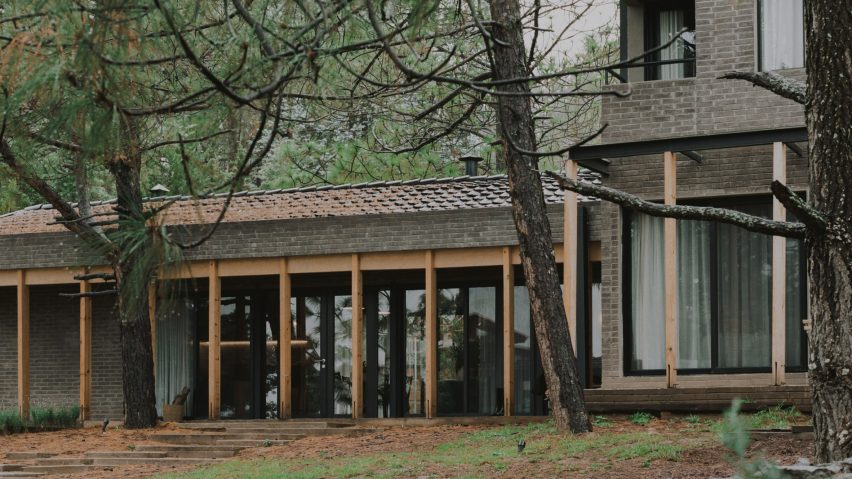Domestico Estudio has arranged a double-gabled house clad in grey bricks in a way that preserves the surrounding forest in Hidalgo, Mexico.
Known as Madí House, the 2,200-square-foot (205-square metre) residence was constructed in 2022.
"It is located in the foothills of the mountains that surround Huasca de Ocampo, in the state of Hidalgo and one of the primary requirements of the project contemplated the conservation of most of the pre-existing forest of the site, thus conditioning the location of the house in the freest space and with the least environmental impact," the Domestico Estudio team, which is based in Mexico City, told Dezeen.
"The required spaces were ordered based on the appropriate orientation according to the footprint defined mainly by the largest trees.”
Selected for its thermal properties in the mountainous climates, the house is clad in brick in tones ranging from grey to black.
The selection "achieved a blend with the chromaticity of the forest and that made reference to the historical context of the mining region, where the haciendas and natural landscapes have a similar chromaticity and texture."
The use of brick allowed different treatments across the seven facades, which located windows and doors according to the interior program and views of the surrounding forest, rather than having to follow a more rigid material framework.
"In this way, the design began from an exploration that integrated different shapes and exterior colors that managed to blend in with their immediate surroundings, keeping in mind that the priority was to achieve adequate integration with the forest and the land’s topography," the team said.
"Silence and contemplation were the conceptual axes of this project that are integrated into its context holistically and discreetly."
Employing a hybrid design between a multigenerational house and a retirement home, the four-bedroom residence is set on a trapezoidal hillside property.
Terraced levels mitigate the slope with the private portions of the program on the hillside, transitioning downward to public areas. The program is composed of two gabled volumes connected to form a T shape.
The two-storey volume, which runs northeast to southwest, contains the sleeping quarters with two suites on either end of both levels. An atrium-like central core holds a sleek wooden staircase, which is lit from a second-storey window. Residents can pass under the stair landing into a small office space that looks out to the forest.
The single-storey portion, which runs northwest to southeast, includes the public areas of the home, lining the living, dining, and kitchen areas with a large colonnaded porch with natural wood columns.
Glazed sliding and French doors sit on either side of the dining room, bringing light and air across the centre of the plan.
While the exterior is mostly dark-coloured, the interiors are light with neutral-toned walls and light wooden accents.
However, the wall that connects the two bars stands out with bold, charcoal-coloured bricks, and a black metal stove floats freely between the living and dining rooms.
"The structural-spatial modulation of 16.80 meters by 4.20 metres is the product of an analysis of the distance of the trees on the terrain," the studio said.
"This made it possible to modulate the spaces in fractions of those measurements to achieve minimum dimensions of comfort and operation, in addition to granting flexibility to the house."
Moving off the main porch, steps proceed down to a covered patio space and pool deck, while a series of rectangular stepping stones descend the hillside.
In order to make the home as independent as possible and reduce its regional environmental impact, the team integrated a rainwater recovery, filtering, and purification system.
Its location in the forest will allow the annual precipitation to supply the house with water for the rainy season and a few more months out of each year.
Other houses recently constructed in Mexican forests include Estudio Atemporal's multi-building home in Valle de Bravo and Herchell Arquitectos' hotel-style courtyard house in Jalisco.
The photography is by Zaickz Moz.
Project credits:
Architects in charge: Carlos Nuñez, Fernanda Quintana, Guillem Villanueva, Elisa Herrera and Andres Celorio

